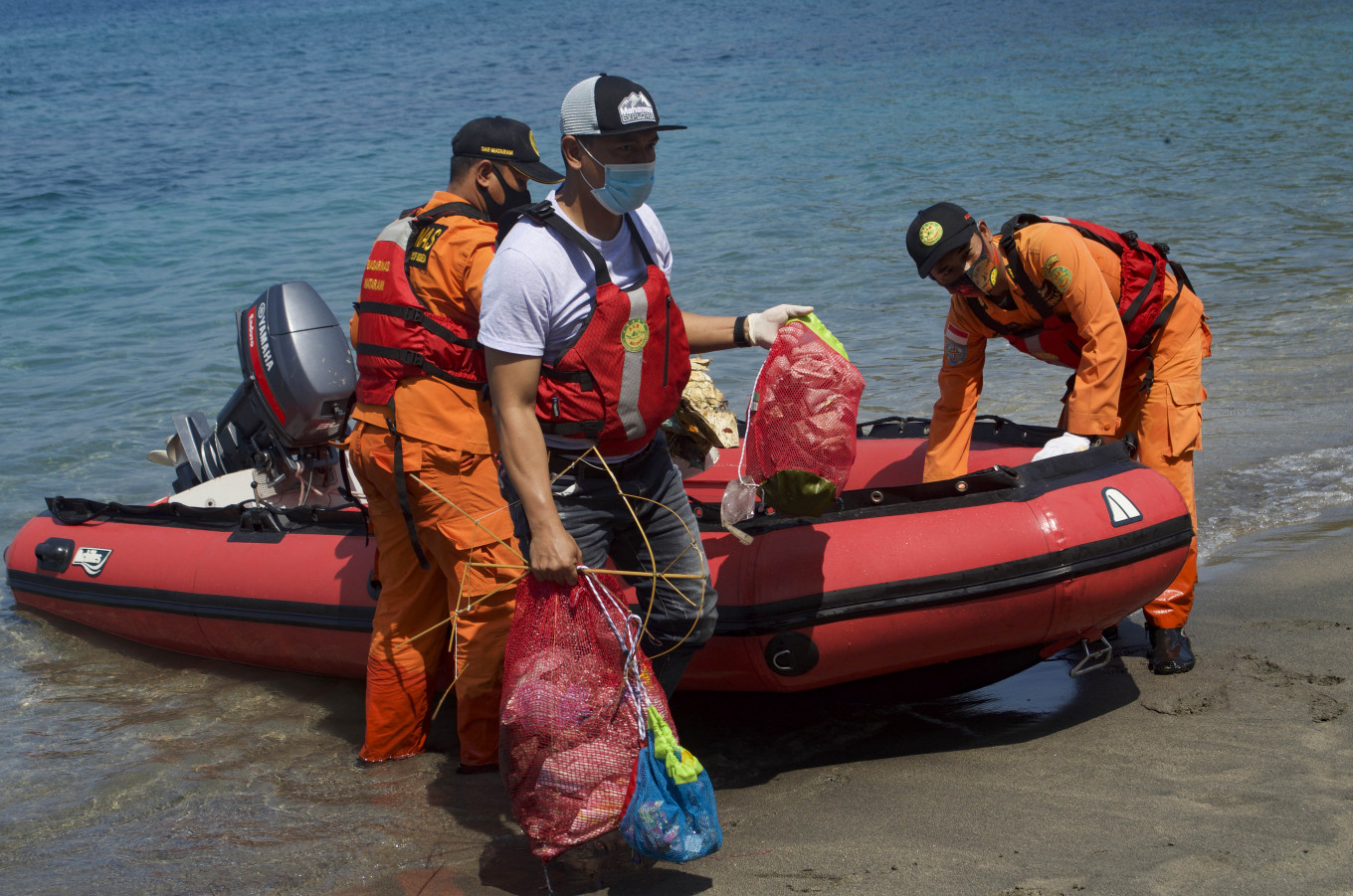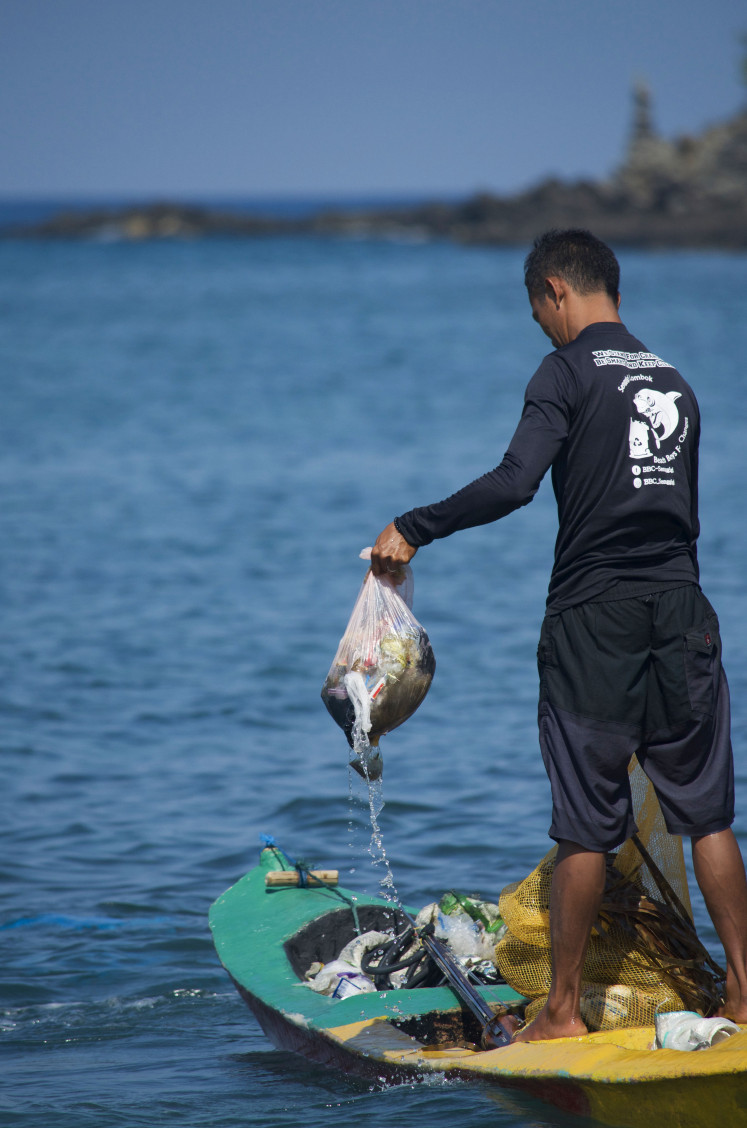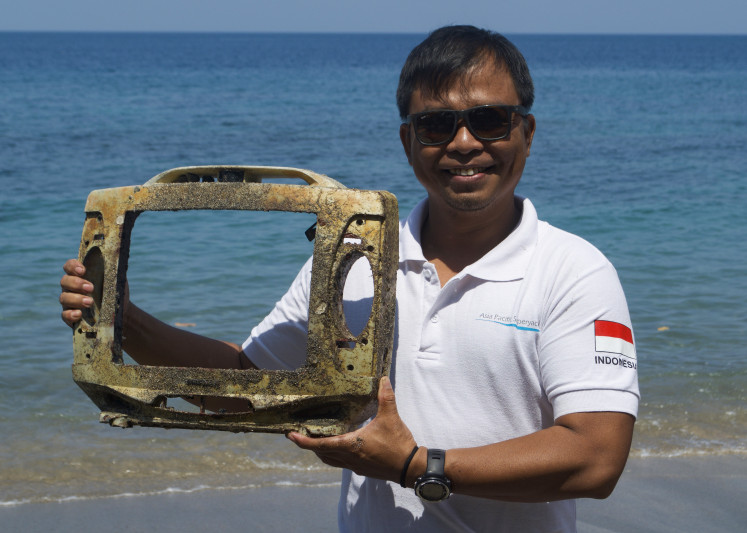Popular Reads
Top Results
Can't find what you're looking for?
View all search resultsPopular Reads
Top Results
Can't find what you're looking for?
View all search resultsCommunities in Lombok work hand-in-hand to tackle plastic waste
Change text size
Gift Premium Articles
to Anyone
T
o mark World Cleanup Day on Sept. 19, local non-profit organization Lombok Ocean Care brought together 652 volunteers to clean up beaches and roads from 8 a.m. to 10:30 a.m., while following COVID-19 health and hygiene protocols.
The volunteers included local residents, representatives of the Lombok Environment and Forestry Agency, local NGOs as well as employees of major hotels like the Sheraton Resort, restaurants and minimarkets chains such as Indomaret.
They joined forces to clean up Senggigi beach as well as several kilometers of road stretching from Senggigi to Batu Layar.
The wide extent of the sites allowed the volunteers to avoid crowding together, all while cleaning their hands regularly using sanitizer and wearing face masks, according to Lombok Ocean Care leader Christine Sakinah Nauderer.
“Then, when we had to go into the water to collect the trash, we switched to snorkelling masks. The COVID-19 pandemic has raised people’s awareness about the importance of maintaining a clean environment,” Nauderer told The Jakarta Post recently over the phone.
She and a few friends established Lombok Ocean Care in 2019 after the devastating Lombok earthquake as part of an effort to inspire locals to rebuild the island's tourism by keeping it clean. The COVID-19 pandemic's adverse impacts on local tourism has made the cause more important than ever.
The organization works closely with the Lombok environment and forestry and tourism agencies, which regularly send new civil servants to join its beach cleaning activities to learn about waste management. The organization also educates young children about waste management.
“We inform locals that they can turn plastic waste into money by supplying it to recyclers,” she explained. On Saturday, the volunteers were able to collect 2,048 kilograms of organic waste and 2,964 kilograms of non-organic waste, including plastic.
The collected trash was subsequently transported by the local agency to the Kebon Kongok landfill, which sorts non-organic trash from organic waste, Nauderer said.
Since May 2020, the organization has also resumed its weekly Senggigi beach clean-up activities after it had stopped them for two months after the coronavirus outbreak was announced. Organized under strict health and hygiene protocols, the weekly activities involve dozens of people.
“The beaches were empty but they have been dirtied from the rubbish in the river. I also involved my guests in the beach clean-up,” said Gill Westaway, the owner of Villa Karingal, who regularly takes part in weekly clean-ups organized by Lombok Ocean Care.
She added that local tourists had begun coming to stay at her place again in the last few months.
Plastic, plastic everywhere: A member of local group Beach Boys for Change Senggigi from Senggigi Beach in Lombok, West Nusa Tenggara, collects plastic waste from the ocean on World Cleanup Day in Lombok on Sept. 19. While the COVID-19 pandemic has slowed down tourism on the island, it has not slowed down plastic waste – which flows from the river – from polluting the ocean one bit. (Existence Now/Christina Alexander)People from around Selong Belanak beach in Lombok have also resumed their beach clean-up activities amid COVID-19.
“We’ve started [clean-up activities] again within the last three weeks because sadly, the global economic slowdown brought by COVID-19 hasn’t slowed the production of plastic waste a bit,” Elissa Gjertson said.
Gjertson is a member of the Selong Belanak Community Association and cofounder of Plastik Kembali, which recycles plastic waste into design-focused art and goods.
Look what I’ve found: Volunteers who clean Senggigi Beach every week are often surprised at the trash they find under water, including things as disgusting as dirty diapers. This man found a rusty television frame. (Existence Now/Christina Alexander)The beach cleaners supply the plastic waste to recyclers so it can get a new lease on life, Gjertson said. However, she lamented that the pandemic had given the association no choice but to pause its school visit activities to educate local children on waste management.
Sometimes the trash they find can be quite disgusting. “People put dirty diapers in plastic bags and throw them in the ocean,” Westaway said.
Nonetheless, she derived great joy from the activity.
“There’s a sense of achievement I get from knowing that the beach is clean, even knowing that a week later it will be dirty again,” she said.












